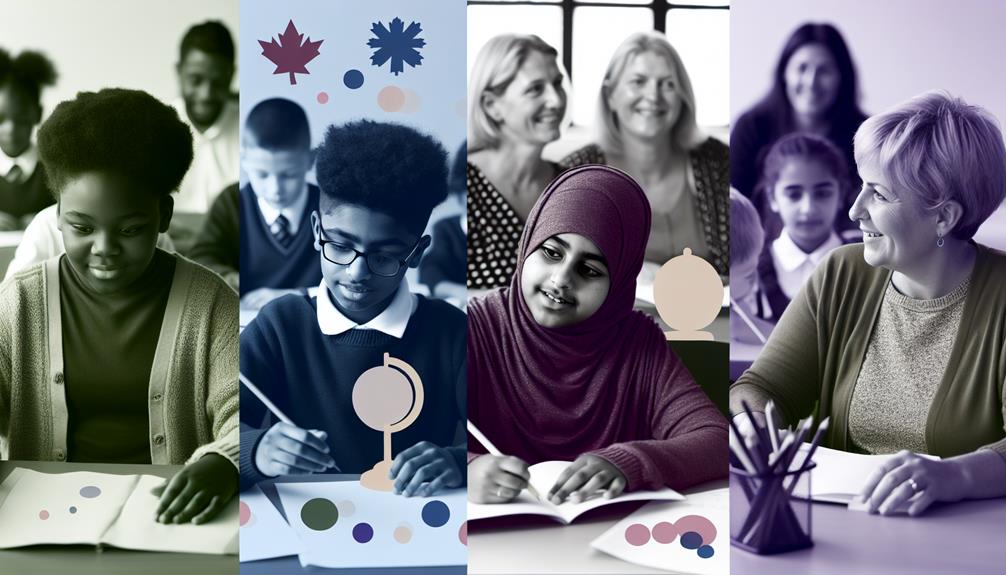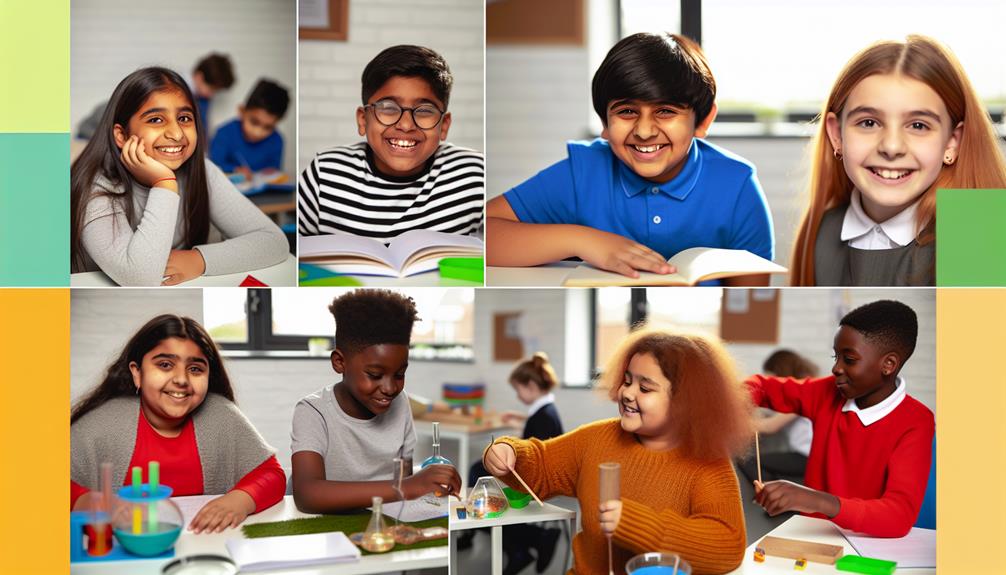Improved educational results for UK foster children can be achieved through a combination of inclusive practices, resilience building, and trauma-informed teaching. You must advocate for educational continuity despite changes in foster placements. Engage foster children in extracurriculars to enrich their experience and bolster self-esteem. Caregivers play an influential role, and their training is essential in bridging learning gaps. Instigating policy reforms that prioritize foster children's education is vital. There are inspiring examples of success in this area and a multitude of useful strategies to explore. Delve into, there's a wealth of knowledge ahead waiting to be unfolded.
Key Takeaways
- Implementing trauma-informed teaching techniques can enhance learning outcomes for UK foster children.
- Encouraging participation in extracurricular activities can improve self-esteem and academic performance.
- Caregivers' engagement with foster children's education significantly influences academic progress, necessitating enhanced training.
- Tailoring educational strategies and integrating edtech can address unique learning needs and improve accessibility.
- Advocacy for policy reform to prioritize foster children's education can lead to improved educational results.
Understanding the UK Foster Care System

To truly grasp the educational outcomes of UK foster children, you first need to understand the intricacies of the UK Foster Care System itself. This system is vast and multifaceted, with processes and structures often intersecting with societal attitudes, such as social stigma and misconceptions.
Central to the system are adoption processes that are designed to protect the best interests of the child. However, these processes can be lengthy and complicated, sometimes resulting in children spending an extended period in foster care. Delays can be due to rigorous checks, bureaucracy, and sometimes, the social stigma associated with adoption. These factors can impact the educational continuity, stability, and overall outcomes of these children.
The social stigma around adoption and foster care also plays a significant role. Foster children often face negative societal attitudes and misconceptions, which can pose additional challenges in their academic pursuits.
Current State of Foster Childrens Education
When examining the educational landscape for foster children in the UK, it's evident that they face unique challenges, often resulting in lower academic achievements compared to their non-foster peers. This isn't due to a lack of potential, but rather the circumstances they endure.
To comprehend this better, let's explore these key areas:
- Foster children's resilience: Despite the adversities, many demonstrate commendable resilience, often succeeding academically against the odds. However, this resilience isn't universal and doesn't mitigate the need for systemic improvements.
- Education funding disparity: Despite increased funding for disadvantaged students, the gap between foster children and their peers remains. This inequality indicates that funds may not be effectively targeted or sufficient.
- Overall academic achievement: Foster children typically underperform in exams, with only 17.3% achieving 5 A*-C GCSE grades, including English and Maths, compared to 53.2% of non-foster children.
- Post-16 education: The gap widens further in post-16 education, with only 6% of care leavers in higher education at 19, compared to roughly 50% of the general population.
Understanding these issues is the first step towards improving the educational results for foster children in the UK.
Challenges in Foster Childrens Academic Performance

Building on the understanding of the current state of foster children's education, let's now examine the specific hurdles these children face that contribute to their academic promoting challenges. Two major obstacles are stigma reduction and fostering resilience.
Stigma can impact a foster child's ability to perform academically. They're often labeled, bullied or isolated because of their foster status, which can lead to a negative self-perception and reduced motivation to succeed. Foster resilience, on the other hand, is the ability to bounce back despite these adversities. It's essential for these children to develop resilience to navigate through these challenges and maintain their educational trajectories.
| Challenge | Potential Solution |
|---|---|
| Stigma | Anti-bullying and inclusivity programs |
| Lack of Resilience | Resilience-building interventions |
To overcome these hurdles, schools can implement anti-bullying and inclusivity programs to reduce stigma. Additionally, resilience-building interventions can provide foster children with the skills they need to face adversity. Though these challenges are important, they're not insurmountable. With the right support and interventions, we can improve the academic performance of foster children.
Impact of Foster Care on Learning Abilities
Exploring the impact of foster care on learning abilities, it's important to highlight that frequent changes in caregivers and living situations can greatly disrupt a child's educational continuity and cognitive development. This disruption often translates into learning disabilities and a diminished capacity to acquire new skills.
- Trauma impact: The trauma experienced by many foster children can lead to mental health issues, which in turn affect concentration, memory, and overall learning ability.
- Inconsistent schooling: Frequently changing homes might mean changing schools, which can lead to gaps in learning and difficulty in keeping up with the curriculum.
- Learning disabilities: The unstable environment often found in foster care can exacerbate existing learning disabilities or contribute to their development.
- Lack of support: Not having a consistent caregiver can mean a lack of steady academic support, which is vital for overcoming learning challenges.
Importance of Educational Support for Foster Children

Given the educational challenges foster children often face, it's evident that strong educational support can greatly enhance their learning outcomes and overall development. This is where the concept of trauma-informed teaching comes in. As you may know, trauma can severely impair a child's ability to learn, making the teaching process more complex. However, adopting a trauma-informed approach can help teachers understand and address the unique needs of these children, fostering a safe and supportive learning environment for them.
Furthermore, the significance of extracurricular involvement can't be overstated. Participating in these activities not only enriches their learning experience but also helps foster children build social skills, self-esteem, and resilience, all of which are critical for their overall development.
Research shows that when these two elements are integrated into the educational support system, foster children are more likely to succeed academically. It's crucial to emphasize that while this is a promising start, consistent and dedicated effort is needed to fully harness these strategies.
In a nutshell, the educational support for foster children in the UK needs to be multifaceted, incorporating trauma-informed teaching and encouraging extracurricular involvement to truly make a difference.
Innovative Teaching Strategies for Foster Children
As we consider the educational outcomes for UK's foster children, innovative teaching strategies become paramount.
You'll find that tailored learning approaches, enhancing emotional intelligence, and encouraging peer interaction offer proven benefits.
Let's explore how these strategies can be effectively utilised to support and enhance the learning experience of foster children.
Tailored Learning Approaches
In the domain of UK education, a substantial number of foster children have demonstrated notable enhancement in their academic performance through customized learning approaches, underscoring the significance of innovative teaching strategies. This improvement can be largely attributed to:
- Personalised curriculum: A tailored syllabus addresses each child's individual strengths, weaknesses, and interests, boosting their engagement and comprehension.
- Mentorship programs: These provide the children with role models who guide their learning journey and foster a nurturing educational environment.
- Technology integration: Digital tools and software adapt to each learner's pace and style, making education more accessible and engaging.
- Collaborative learning: Group projects and discussions encourage social interaction, which is often lacking in foster children's lives.
Enhancing Emotional Intelligence
Foster children's emotional intelligence can be substantially enhanced through innovative teaching strategies that focus on emotional awareness, empathy development, and effective expression of feelings. Emotional intelligence workshops play a pivotal role in this process.
These workshops provide structured environments where children can identify, understand, and manage their emotions effectively. They're designed to foster self-awareness and social skills, both vital for emotional intelligence.
Moreover, trauma-informed learning is a key approach that acknowledges the impact of traumatic experiences on learning and behavior. This approach equips teachers to respond empathetically to foster children's unique emotional needs, which often stem from past trauma.
Evidence indicates that these strategies significantly improve foster children's emotional intelligence, thereby enhancing their overall educational outcomes.
Encouraging Peer Interaction
Building on the benefits of emotional intelligence, encouraging peer interaction among foster children is another innovative teaching strategy that has shown significant promise in boosting their educational outcomes.
- Promoting extracurricular activities: Foster kids, like all kids, need diverse experiences. Encourage them to join clubs, sports, or arts programs. This exposes them to different social situations, enhancing their interaction skills.
- Boosting self-esteem: Peer interaction often bolsters confidence. Positive feedback from peers can lead to improved self-perception.
- Developing social skills: Regular interaction with peers develops communication abilities, problem-solving skills, and empathy.
- Creating a support network: Friends provide essential support, which is essential for foster children.
Incorporating these strategies can lead to heightened academic performance, better emotional wellbeing, and ultimately, an improved life trajectory for these children.
Role of Caregivers in Foster Childrens Education
You'll find that caregivers play an essential role in the educational outcomes of foster children in the UK. Their influence on education can be significant, shaping learning experiences and bridging educational gaps.
With the right support and involvement, foster caregivers can become key drivers of academic progress for these children.
Caregivers Educational Influence
In the domain of foster children's education, the role of caregivers can't be understated, as they often serve as the primary drivers of educational progress and academic achievement. Their influence varies depending on the child's background, with adoption influence and biological family impact playing distinct roles.
- Adoption Influence: Adoptive parents can provide a stable and supportive environment conducive to learning.
- Biological Family Impact: Biological families may affect a child's learning capabilities and attitudes towards education, even when not in direct care.
- Caregiver Attitude: The caregiver's attitude towards education can have a significant impact on a foster child's academic engagement and achievement.
- Caregiver Educational Background: The caregiver's own educational history and values can shape the child's academic journey.
Understanding these factors can help shape strategies that maximise educational outcomes for foster children.
Addressing Learning Gaps
Given the significant impact caregivers have on foster children's educational journeys, it's their responsibility to address and bridge any learning gaps that exist. You can enhance curriculum diversity by introducing resources that cater to each child's unique learning style. Adopting e-learning, for instance, offers flexibility and personalisation, essential for closing these gaps.
Here's a snapshot on how you can help:
| Strategy | Implementation | Benefits |
|---|---|---|
| Adopting E-learning | Use online resources, interactive tools | Addresses individual learning pace, enhances engagement |
| Enhancing Curriculum Diversity | Introduce varied learning materials | Caters to different learning styles, interests |
| Regular Assessment | Monitor progress, identify gaps | Enables targeted intervention, tracks improvement |
Case Studies: Successful Educational Outcomes

Let's explore several case studies that highlight foster children in the UK who've achieved remarkable educational success. These stories provide valuable insights into the role of smooth school changes and extracurricular involvement in improving academic results.
- Sarah's Story: Sarah moved through three schools within two years. However, with appropriate support systems in place, she managed to excel academically. Her success emphasizes the importance of stability and continuity in school shifts.
- Jake's Story: Jake's love for drama helped him flourish in his education. His active participation in the drama club was a catalyst, enhancing his confidence and academic performance.
- Amelia's Story: Amelia, despite relocating between different foster homes, maintained excellent grades. Her story highlights the significant role of a nurturing home environment in fostering educational success.
- Tom's Story: Tom excelled in his GCSEs while actively engaging in the school's chess club. His case demonstrates the positive impact of extracurricular activities on academic accomplishment.
These case studies serve as powerful reminders of the potential for success that foster children possess. They underscore the positive influence of stable school changes and meaningful extracurricular involvement on foster children's educational outcomes.
Policy Recommendations for Improving Education
You've seen the data and read the success stories; now, let's turn to policy.
To improve educational outcomes for UK foster children, we need to contemplate strategies such as:
- Enhancing foster care education,
- Implementing supportive learning approaches, and
- Fostering academic success.
What do these strategies look like in practice, and what's the evidence supporting their effectiveness?
Enhancing Foster Care Education
To greatly enhance foster care education in the UK, one must consider several policy recommendations that are rooted in sound research and have demonstrated success in other settings.
- Foster edtech integration: Investing in modern technologies can enhance the learning experience and accessibility for foster children.
- Creative curriculum: Implementing a curriculum that's specifically designed to engage and inspire fosters creativity, critical thinking, and problem-solving skills.
- Training for foster parents: Equip foster parents with the necessary skills to support the educational needs of their charges.
- Policy reform: Advocacy for improved policies that prioritize the educational needs of foster children.
These approaches, if adopted, can significantly improve the educational outcomes of foster children. It's a matter of understanding the unique needs of these children and tailoring educational strategies to meet them.
Implementing Supportive Learning Strategies
Building on the foundation of enhanced education for foster children, it's also important to implement supportive learning strategies tailored to their unique needs. By adapting the curriculum, you cater to their diverse learning styles and personal experiences, promoting a more inclusive and effective learning environment.
Evidence shows that personalised learning strategies improve academic performance and overall well-being for foster children. Additionally, encouraging foster children's extracurricular participation enhances their social skills and self-esteem. It provides a platform for them to discover their potential outside the structured learning environment.
Both strategies foster a well-rounded development, vital for their future success. Hence, integrating these supportive learning strategies into foster children's education to optimise their academic and personal growth is necessary.
Fostering Academic Success
In light of the unique challenges foster children face, it's important to devise proactive policies aimed at fostering their academic success. Overcoming stereotypes and combatting foster care stigma are essential to this process.
Here are four policy recommendations that could make a substantial difference:
- Enhanced Training for Caregivers: Foster parents should receive training on how to support their children's educational needs effectively.
- Mentorship Programs: Implementing mentorship initiatives can provide foster children with positive, academically successful role models.
- Curriculum Review: Schools should review their curriculums to make sure they're inclusive and don't perpetuate stereotypes.
- Awareness Campaigns: Public campaigns can help address the stigma around foster care, promoting understanding and acceptance.
Each of these can contribute significantly to fostering academic success among foster children.
Future Prospects for UK Foster Childrens Education
Exploring the landscape of future educational opportunities, UK foster children's prospects are increasingly bright, as policies and support mechanisms evolve to better address their specific needs. The drive to foster entrepreneurship within this group is a proof of this, as it's not just about equipping these children with academic prowess, but also with the skills to create opportunities for themselves. Initiatives like mentoring programs and business-focused workshops are now more commonplace, providing a platform for these children to grow as future entrepreneurs.
Reducing stigmatization is another area of focus. It's essential to change perceptions and create an environment where foster children are seen for their potential rather than their backgrounds. Efforts are being made to make sure these children aren't just integrated into the regular school system, but are also given the same opportunities for success. More schools are adopting policies that promote inclusivity and fairness, ensuring foster children are treated with respect and dignity.
The future of UK foster children's education looks promising. With continued efforts in these areas, these children can look forward to a future where their educational needs aren't just met, but exceeded.
Frequently Asked Questions
How Can Foster Children Cope With Emotional Turmoil While Focusing on Their Education?
You can foster emotional resilience strategies, helping you manage turmoil while enhancing academic focus. Therapeutic education approaches, specifically tailored to your needs, can greatly enhance your emotional well-being and academic performance.
Can the Foster Care System in the UK Be Compared to the Systems in Other Countries?
Ever wondered how the UK's foster care system stacks up internationally? It's quite diverse. Foster system variations globally offer unique insights, but you can't make direct comparisons without considering cultural, social, and legal differences.
Are There Any Extracurricular Programs Specifically Designed for UK Foster Children?
Yes, there are programs like Foster Sibling Support and Creative Therapy specifically designed for UK foster children. They're aimed at enhancing social skills and therapeutic healing, which foster better educational outcomes.
How Does the UK Government Ensure the Mental Health of Foster Children Is Taken Care Of?
The UK government guarantees foster children's mental health through Therapeutic Interventions and strict adherence to Mental Health Legislation. They're dedicated to providing necessary support and care, prioritising their emotional wellbeing.
What Are the Steps Taken to Ensure Foster Children's Smooth Transition to Higher Education or Vocational Training?
You're guaranteed a seamless shift through financial support and mentorship programs. These steps, aimed at facilitating your move to higher education or vocational training, are essential in nurturing your success and future prospects.
Conclusion
Improving the educational outcomes for UK foster children isn't just desirable, it's essential.
Consider James, a former foster child who, with the right educational support, thrived and is now studying law at university.
It's up to us to guarantee all foster kids get the tailored support they need.
By implementing policy changes and encouraging caregiver involvement, we can make such success stories the norm, not the exception.
Our foster children deserve nothing less.




